|
|
|
Sort Order |
|
|
|
Items / Page
|
|
|
|
|
|
|
| Srl | Item |
| 1 |
ID:
117834


|
|
|
|
|
| Publication |
2012.
|
| Summary/Abstract |
This article provides a working taxonomy of the concept of 'alignment' in the discipline of International Relations (IR); a heretofore major deficiency in the otherwise abundant literature on alliance/alignment. It further contends that the label 'alliance' is commonly employed reflexively and unreflectively, where in fact the term 'alignment' would be a superior and more accurate descriptor. This contention is buttressed by empirical developments in international politics. The article makes the case that the contemporary security environment is characterised by multiple forms of 'alignment', not just alliances, in their many guises. In addition, we can identify 'coalitions', 'security communities', and 'strategic partnerships'; all distinctly different from the conventional 'alliance' archetype. It concludes that a change in our thinking about defining and conceptualising alignment and alliance is required to bring disciplinary work closer in line with the paradigmatic shift that is occurring in contemporary international politics.
|
|
|
|
|
|
|
|
|
|
|
|
|
|
|
|
| 2 |
ID:
117835


|
|
|
|
|
| Publication |
2012.
|
| Summary/Abstract |
This article examines power implications of digital diasporas and the identity negotiation processes they afford. Members of diasporas are potentially socially and psychologically disempowered by two sources: the majority society into which they are dispersed; and the traditional social structures and culture from which they emerged. This potential disempowerment highlights the important role of power in facilitating (or not) migrant integration into new societies, and the integration of values and norms that are increasingly considered universal. The diaspora experience and Internet discussion forums provide enabling normative structures and discourses for individuals to define and pursue their own interests and ideals. Following a review of the literatures on diaspora identity hybridity and power, the case of TibetBoard illustrates how information technology enables diaspora members to explore, negotiate, and validate their self-determined identity and political perspectives, moving beyond passive adoption of traditional perspectives rooted in the Tibetan community of the homeland and in exile.
|
|
|
|
|
|
|
|
|
|
|
|
|
|
|
|
| 3 |
ID:
117836


|
|
|
|
|
| Publication |
2012.
|
| Summary/Abstract |
This article examines the subtle and not so subtle shifts in Canadian political culture that have taken place in, through and alongside the so-called 'return' of the Canadian warrior. It begins from the contention that while the racialised dimensions of the post 9/11 Canadian security state have been well analysed elsewhere, the gendered dimensions have not been fully explored. This article explores the re-emergence of a sacrificial imaginary in Canadian culture through an examination of seemingly irreconcilable accounts that have emerged of the Canadian security state - one that reads 'Canada' through the story of the torture and repatriation of Canadian citizen, Maher Arar, and one that tells the story of 'Canada at War' through the warrior's return. It examines both in terms of the tensions and instabilities they reveal in the Western liberal imaginary and in terms of the ways in which they collectively operate to redefine the aesthetic borders of the Canadian political community. The article argues that the sacralisation of violence which has refound this political community has been enabled by a remasculinised aesthetic that delimits the 'progressive liberalism' which animated the Canada of Old - ostensibly in order to protect it.
|
|
|
|
|
|
|
|
|
|
|
|
|
|
|
|
| 4 |
ID:
117842
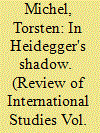

|
|
|
|
|
| Publication |
2012.
|
| Summary/Abstract |
The field of International Relations (IR) although in many quarters still immersed in the epistemological trenches surrounding the fourth debate between positivism and post-positivism saw the emergence of a renewed interest and debate about the state and rigour of 'our' ontological assumptions. One currently very prominent contribution to this emerging or re-emerging interest in ontological questions can be found in the Critical Realist (CR) approach.
|
|
|
|
|
|
|
|
|
|
|
|
|
|
|
|
| 5 |
ID:
117840
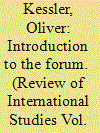

|
|
|
|
|
| Publication |
2012.
|
| Summary/Abstract |
In the last couple of years, Critical Realism has established itself as an alone-standing intellectual movement in International Relations (IR). It not only seeks to challenge the idea of the middle ground on which most of the more moderate versions of constructivist thought base their convictions, but it also seeks to provide own answers to basic scientific problems around the relationship between facts and values, causation and causality, or agents and structure. If one would want to characterise Critical Realist positions, one has to point to their attempted resurrection of ontology. Taking inspiration, in particular, from Bhaskar's Possibility of Naturalism and subsequent works, different strands of Critical Realism are tied together in their conviction that epistemology has had too much influence on scientific debates ever since Kant changed the structure of philosophical reasoning by asking how objects were determined by concepts rather than the other way round. The prevalent focus on epistemological questions is not only biased and asks the wrong questions, but it starts from false premises in the first place, as Wight and Patomäki once put it: every theory of knowledge must also logically presuppose a theory of what the world is like (ontology) for knowledge (epistemology) to be possible.
|
|
|
|
|
|
|
|
|
|
|
|
|
|
|
|
| 6 |
ID:
117841
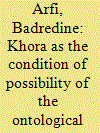

|
|
|
| 7 |
ID:
117832
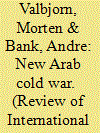

|
|
|
|
|
| Publication |
2012.
|
| Summary/Abstract |
This article provides a conceptual lens for and a thick interpretation of the emergent regional constellation in the Middle East in the first decade of the 21st century. It starts out by challenging two prevalent claims about regional politics in the context of the 2006 Lebanon and 2008-09 Gaza Wars: Firstly, that regional politics is marked by a fundamental break from the 'old Middle East' and secondly, that it has become 'post-Arab' in the sense that Arab politics has ceased being distinctly Arab. Against this background, the article develops the understanding of a New Arab Cold War which accentuates the still important, but widely neglected Arab dimension in regional politics. By rediscovering the Arab Cold War of the 1950-60s and by drawing attention to the transformation of Arab nationalism and the importance of new trans-Arab media, the New Arab Cold War perspective aims at supplementing rather that supplanting the prominent moderate-radical, sectarian and Realist-Westphalian narratives. By highlighting dimensions of both continuity and change it does moreover provide some critical nuances to the frequent claims about the 'newness' of the 'New Middle East'. In addition to this more Middle East-specific contribution, the article carries lessons for a number of more general debates in International Relations theory concerning the importance of (Arab-Islamist) non-state actors and competing identities in regional politics as well as the interplay between different forms of sovereignty.
|
|
|
|
|
|
|
|
|
|
|
|
|
|
|
|
| 8 |
ID:
117845
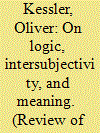

|
|
|
|
|
| Publication |
2012.
|
| Summary/Abstract |
The idea that our world is not just a mixture of unrelated incidents but shows some intelligible characteristics is probably the starting point of every analysis in International Relations (IR). We assume that what happens shows structure and significant connections of processes and flows. Unfortunately, opinions diverge soon thereafter: how does that assumed structure relate to our minds? Is it independent of our theories, cultural presuppositions, or opinions? What kind of objectivity can we hope for? Critical realists and radical constructivists seem to entertain different ideas about what the 'ontological status of reality' is and whether and how we can know about it. An intellectual encounter between Colin Wight and Friedrich Kratochwil has shown to what extent related questions about intersubjectivity, reference, and meaning touch upon questions about the logos. Interestingly enough, both agree that the 'classic' bivalent logic provides only an insufficient grounding for an adequate understanding of the world. Yet both are silent on providing reasons why this is the case. Hence, it might well be that constructivists and critical realists actually do share some reservation or critique.
|
|
|
|
|
|
|
|
|
|
|
|
|
|
|
|
| 9 |
ID:
117843
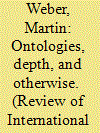

|
|
|
|
|
| Publication |
2012.
|
| Summary/Abstract |
This contribution investigates in some more depth a limited set of the premises on which Wight's argument for a 'scientific realist' approach to the study of International Relations (IR) rests, an approach, which, according to him, raises the hitherto unacknowledged centrality of ontological premises to all forms of knowledge and human action. Positing 'Politics as Ontology' (the book's subtitle) permits, so Wight's argument goes, the conduct of social science in a way which renders most epistemological and methodological disagreements obsolete, since the latter can be shown to be enabled only by competing, mutually exclusive, relatively incompatible, or unreflectively fragmentary ontological commitments. On this view, clarifying the respective ontological commitments, which underpin - tacitly or explicitly - competing theories yields the prospect of demonstrating relatively precisely what it is that enables disagreements at the levels of epistemology and methodology to arise in the first place. Programmatically, Wight seeks to establish the scientific realist account as a consistent, critical, fallibilist, unified account of scientific practice, reintegrating social and natural sciences in a reconceptualised naturalist scheme.
|
|
|
|
|
|
|
|
|
|
|
|
|
|
|
|
| 10 |
ID:
117839


|
|
|
|
|
| Publication |
2012.
|
| Summary/Abstract |
This article considers a conceptual framework for peacekeeping cooperation between the United Nations and regional organisations. It articulates the 'subcontracting' and 'partnering' modes of global-regional peacekeeping cooperation, and examines how they have been practiced through efforts to form institutional partnerships with the African Union (AU) and the European Union (EU). The article argues that there is incremental progress in institutionalising global-regional cooperation in peacekeeping, and yet managing such cooperation in the future requires a clearer understanding of the role of the UN in the globalisation of peacekeeping.
|
|
|
|
|
|
|
|
|
|
|
|
|
|
|
|
| 11 |
ID:
117833
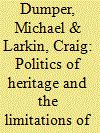

|
|
|
|
|
| Publication |
2012.
|
| Summary/Abstract |
This article problematises international heritage interventions in divided cities through exploring UNESCO's role in Jerusalem's Old City. It examines the tension between universal heritage values and protocols and nationalist agendas which often involve politicised archaeological responses. Drawing on comparative case studies of UNESCO-affiliated projects in Fez and Aleppo, and in the violently divided cities and regions of Mostar and Kosovo, it assesses future challenges and possibilities facing UNESCO in Jerusalem. While the article confirms an increased need for an international arbitrator and protector for the city's sacred sites and divided cultural heritage, it also underscores the limitations of UNESCO's legal remit and the political sensitivities which hinder its praxis.
|
|
|
|
|
|
|
|
|
|
|
|
|
|
|
|
| 12 |
ID:
117838
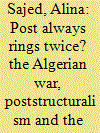

|
|
|
|
|
| Publication |
2012.
|
| Summary/Abstract |
This article makes the case for rethinking the relation between poststructuralism and postcolonialism, by building on the claims advanced by Robert Young, Azzedine Haddour and Pal Ahluwalia that the history of deconstruction coincides with the collapse of the French colonial system in Algeria, and with the violent anti-colonial struggle that ensued. I choose to examine narratives of theorists such as Derrida, Lyotard, and Cixous because not only they provide the link between colonial violence, the poststructuralist project that ensued, and postcolonialism, but also because the problems I identify with their projects are replicated by much poststructuralist work in International Relations (IR). I signal that one of the most significant consequences of conducting poststructuralist research without attention to postcolonial horizons lies in the idealisation of the marginalised, the oppressed or the native without attending to the complexity of her position, voice or agency. Bringing these theories together aims to highlight the need for a dialogue, within IR, between poststructuralism's desire to disrupt the disciplinarity of the field, and postcolonialism's potential to transcend the self-referential frame of IR by introducing perspectives, (hi)stories, and voices from elsewhere.
|
|
|
|
|
|
|
|
|
|
|
|
|
|
|
|
| 13 |
ID:
117837
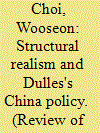

|
|
|
|
|
| Publication |
2012.
|
| Summary/Abstract |
The Eisenhower administration's tough containment policy toward China has been conventionally viewed as an unsensible policy resulting from domestic political pressures or ideology. Refuting the conventional explanations, this article argues that during the early Cold War, the US superiority in bipolarity drove China to balance the United States in Asia. Dulles, the architect of the China policy, made accurate assessments of the power structure in Asia and the inevitable enmity with China. Driven by structural imperative, he decided to pursue containment to maintain the favourable balance of power in Asia by retarding the relative power growth of China allied with the Soviet Union and secondarily by accelerating their conflict through harder pressure on a weaker China. This case long considered as a prime anomaly to balance of power theory actually demonstrates how powerfully distributions of power shape alliance behaviours of states in the anarchic international system.
|
|
|
|
|
|
|
|
|
|
|
|
|
|
|
|
| 14 |
ID:
117844


|
|
|
|
|
| Publication |
2012.
|
| Summary/Abstract |
Discussing matters of philosophy of science within the boundaries of an academic field, which seems to have a fairly well-delineated subject matter, a carefully circumscribed universe of cases to struggle with, is a distinct deviation from normal science. Yet, meta-theoretical quarrels have been lurking on the boundaries of International Relations (IR) ever since the field constituted itself as a relatively autonomous academic enterprise. Never at the centre of the discipline, philosophy of science debates have still been among the most tenacious ones, so there doesn't seem to be a need to justify or legitimate such intellectual pursuits. Suffice it to say that among the many niches of International Relations as a discipline there may also be one dealing with meta-theoretical inquiry.
|
|
|
|
|
|
|
|
|
|
|
|
|
|
|
|
|
|
|
|
|